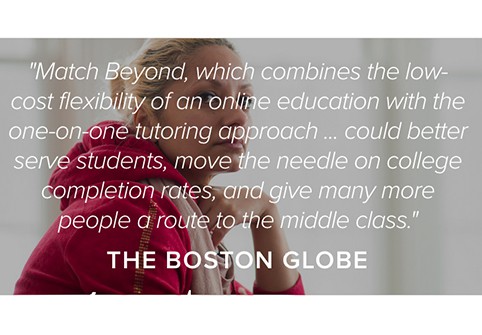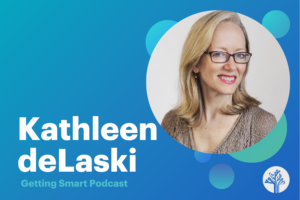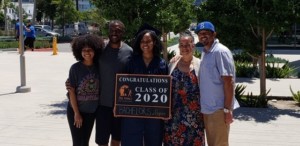Match Beyond And College For America Reimagine HigherEd

Conventional two and four year public colleges serving low-income students are often costly and under-performing. Most low-income students that attempt degrees drop out because of cost, inadequate preparation, a college academic program that lacks rigor and relevance, or the daily challenge of work and family.
In Massachusetts, fewer than 16% of students that enroll in an Associate’s degree graduate within three years according to a recent Boston Globe feature.
Bob Hill, who is a former teacher at Match Public Charter School in Boston, now coaches alumni from high schools across Boston on college completion, in a new program set up by Match Education. The program is called Match Beyond, and it marries College for America (CFA), an innovative new competency-based degree program (see feature) from Southern New Hampshire University, with intensive coaching, academic support and jobs counseling from Match Education. The goal of the program is to produce high degree completion rates and employment for low-income high school graduates across Boston who either never went to college or who left high school before completion.
Hill, his boss Stig Leschly, and the team at Match Education created the hybrid college and jobs model in close collaboration and partnership with CFA.
At the end of 2014, Match Beyond served 49 students. Match Beyond now serves 110 students; 102 students are enrolled in the Associate’s program, and 9 have completed the Associate’s degree and moved on to the Bachelor’s program. These students took between four and 18 months to earn their degrees.
Match Beyond currently has a 92% re-enrollment rate among students who have been enrolled for six months or more.
Nearly all of our students are from low-income backgrounds and currently between the ages of 18 and 35. Over 80% receive federal Pell grants to support their college education, most hold at least one job, and many are responsible for caring for children or other family members.
The greatest concentrations of Match Beyond students are from the Dorchester, Roxbury, and Mattapan neighborhoods of Boston, but we serve students from the entire Greater Boston area. Over 90% of our students are African-American or Hispanic.
Most students have previously enrolled in and failed to complete at least one two-year or four-year college before coming to Match Beyond. Students report that they withdrew from other schools due to cost, challenges reconciling class schedules with work and family commitments, and lack of support. The typical Match Beyond student will be the first in his or her family to graduate from college.
Match Education. Stig Leschly had some early career success as a high-tech entrepreneur (he sold his e-commerce company to Amazon in his late twenties) and for the last 15 years has been working in education, the last four years as CEO at Match Education.
Match Education, run by Leschly, is a diverse and innovative platform for reform. Its charter schools serve 1,250 K-12 students on four Boston campuses, and it produces extraordinary results in part because of an innovative one-on-one or small group tutoring program. Match Education also runs a longstanding, fully approved graduate school of education that trains teachers and instructional leaders for high-poverty schools in intensive, practice-focused residencies. Match’s graduate school of education is a close cousin the Relay GSE, set up by KIPP, Achievement First, and Uncommon Schools, and it was the first new graduate school of education approved in Massachusetts in the last half decade.
Alarmed by few viable paths to quality, affordable degrees and eventual employment available to graduates of Boston’s general high schools, Leschly and his team struck out with Match Beyond and in close partnership with CFA to disrupt the sector.
Andew Balson, who recently joined Match Education to lead Match Beyond, believes the model, if successful, can be easily replicated across the US since it is, at its core, an easily repeated partnership between an online degree provider and local coaching service. Balson, like Leschly, is a convert from the business sector (prior to working at Match Education, he spent 20 years at Bain Capital, one of the largest private equity firms in the world).
The Right Degree. The CFA program is ideal for young adults from low-income communities because it is affordable, flexible, and relevant to employment.
CFA tuition is $5,000 per year. In most cases, Match Beyond students pay tuition to CFA with the help of a Pell Grant and, as a result, incur no financial burden from enrollment.
In 2013, the Department of Education began to make competency-based programs like CFA eligible for Pell grants and federal loans.
The CFA program is project and competency-based which allows Match Beyond students to work at their own pace often maintaining employment and avoiding the cost of room and board associated with a campus-based program.
The degree program is made up of 20 career-relevant projects that help students develop and demonstrate 120 competencies to earn an associate degree. With another 20 projects, students can earn a Bachelor’s degree.
The Right Supports. Match Beyond provides face-to-face study support, personal coaching, and jobs placement services to students in the CFA degree program. These relationship-based support services improve the probability that students will complete their degrees and find jobs.
Match Beyond is designed for replication. If successful in Boston, community-based service providers in other cities could create similar partnerships with CFA.
Coursera has seen similar success with Learning Hubs, local support groups formed around Specializations, a sequence of career-focused online courses.
As recently noted, there are advantages of a traditional liberal arts education where students sampling a sequence of disconnected, sometimes compelling, and very expensive courses. There are critics of online and competency-based approaches but they don’t seem to appreciate the plummeting return on investment of traditional higher education or the disastrous consequences of attempting college, racking up debt and not finishing.
College for America, to its credit, is extending access to college and a shot at participating in the idea economy. And, Match Beyond is demonstrating that when you add focused support to a flexible and affordable degree program, the results are very promising. Match Beyond, and programs like it, could lead to dramatic improvement in degree attainment among young adults from low-income families.
The average Associate’s degree completion rate among low-income students is 13% nationally and 34% in Massachusetts. Leschly’s stretch goal is 75% students completely an Associate’s degree in less than three years.
Beyond the degree Leschly’s goal is 75% graduates obtaining middle class employment with starting salary of at least $35,000 with benefits. He concluded, “For most of our students, such jobs would be life changing.”
For more, check out:
- Southern New Hampshire Reshaping Higher Ed Landscape
- Smart Cities: Boston
- 5 Options Allow GenDIY to Rethink College
[Note: originally published April 15, 2015, updated September 26, 2015]








0 Comments
Leave a Comment
Your email address will not be published. All fields are required.